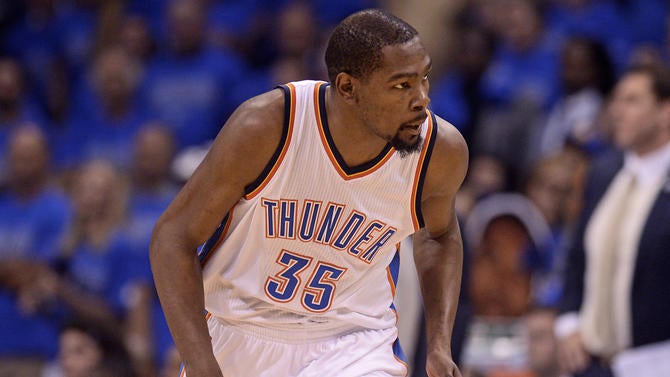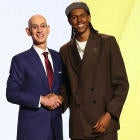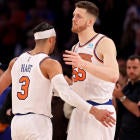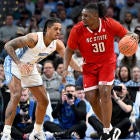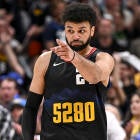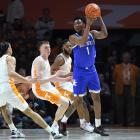One of the long-running jokes of the 2011 lockout was how reporters who were on stakeout duty for five months kept seeing random celebrities walking the streets of Manhattan.
One day, Spurs coach Gregg Popovich strolled by. Another day, it was Tiki Barber. On Halloween weekend, we saw Carmelo Anthony dressed up in an outfit that made him look like a pimp.
Around 5 a.m. one morning, while then-New York Times reporter Howard Beck and I were holed up in the lobby of the Waldorf Astoria writing our stories about some bargaining stalemate or another, Betty White appeared, suitcase in tow and on her way to catch an early morning flight.
On Monday, the Fourth of July, the 2011 collective bargaining agreement had its latest and most important celebrity sighting: Kevin Durant leaving Oklahoma City for the Golden State Warriors.
The NBA will never be the same.
"This is historic in the sense that people will look back and go, 'How did that happen?'" one league source told CBS Sports on Monday. "It changed the face of the NBA historically."
Durant shocked the basketball world in announcing his decision to leave Oklahoma City and join two-time reigning MVP Stephen Curry with the Warriors. It's a two-year, $54 million deal with a player option in 2017 -- but that isn't the story.
The story is a team that won a record 73 games last season and fell one win shy of a second straight NBA title -- a team that already had three All-Stars -- was able to add another top-five player as a free agent. Durant, 27, is a transformative talent and presence, and his decision to join Curry, Klay Thompson and Draymond Green in the Bay Area will send shockwaves not just from conference to conference, but also throughout Silicon Valley and the shoe industry.
It was exactly what the NBA was trying to prevent back in 2011 during a five-month lockout that cost the league 20 percent of the 2011-12 season and more than $800 million.
"There was a break in the system that allowed this to happen," one rival executive told CBS Sports.
The Warriors will be able to do this with only minor roster changes -- trading Andrew Bogut (they've found multiple trade partners already), letting Harrison Barnes sign a max deal with the Mavericks (no need for him anymore), renouncing all their other free agents and filling out the roster with minimum deals.
Voila: Another Super Team has been born in one of the NBA's biggest markets, with a sparkling new arena planned for San Francisco in the next few years.
So to answer the question of the day -- and potentially, of the decade -- this is how it happened.
It happened the same way Mike Conley landed the richest contract in NBA history -- five years, $153 million -- when the free-agent floodgates flew open this past weekend.
It happened by mistake, and through a perfect storm of factors -- both economic and otherwise.
With owners biting their fingers into bloody stumps amid hundreds of millions in annual losses and the formation of the LeBron James-Dwyane Wade-Chris Bosh Super Team in Miami, the league went for the jugular in 2011 collective bargaining. The owners locked out the players and sought a massive reduction in player salaries and a hard salary cap that would spread the talent more evenly around the league and give small- and mid-sized markets a more realistic chance to compete.
They got the reduction in the players' share of revenue, from 57 percent to about 51 percent. They didn't get the hard cap, but they bolstered the luxury-tax system so that big-spending teams would pay a huge price for clustering stars together.
With the lone exception of Mikhail Prokhorov's Brooklyn Nets -- whose largesse ended up being an abject failure -- the system was working for a while. The number of teams paying luxury tax, and the amount they were paying, declined steadily. Player movement was more robust and reasonable at the same time, because contracts were shorter and teams had been given tools -- like the amnesty and stretch provisions -- to more quickly correct mistakes.
Then, something unexpected happened -- something that the CBA was powerless to correct. The NBA soared to unprecedented popularity, and revenues soared right along with it -- up about $1 billion in the last three seasons. Then, the league's $24 billion, nine-year broadcast and digital rights agreements began hitting the player compensation system at 12:01 a.m. ET on July 1. The salary cap spiked overnight from $70 million to $94 million. Predictably, all hell broke loose.
After several years of adjusting to a new normal, 21 teams entered free agency with room to sign a max player. That didn't even include the Warriors, who merely needed to make some minor moves to clear room for the best free agent on the market.
Blame whomever you like: the owners and the league office for not properly anticipating a tripling of the league's TV deal, or the union for failing to agree to the league's proposal to smooth the money into the system gradually. Either way, it was hardly the only factor in this perfect storm.
Just weeks ago, the Thunder were up 3-1 on the defending champion Warriors, blew a late lead at home in Game 6 and lost Game 7 at Oracle Arena. The entire organization, from top to bottom, will now have to spend years contemplating what might have been if they'd been able to close out that series.
Curry, who is either the best player in the league or a close second to James, depending on who you ask, is on a below-market contract that will pay him only $12 million next season. It's a function of when Curry was eligible for an extension of his rookie contract in 2012, and his injury history prior to that. He ended up signing a four-year, $44 million extension and can become a free agent next summer. Without that bargain-basement deal, Durant probably would've announced Monday that he was staying in Oklahoma City.
And much of this speaks to Durant and his priorities, as well. In leaving the Thunder for the Warriors, he opted for being able to choose his teammates and control his own destiny over money. The most lucrative scenario for Durant, by far, was to sign a two-year deal with the Thunder, then opt out next summer and sign a five-year max deal with OKC using Bird rights for a total score of $244 million over six years.
The scenario he chose was only the third-most lucrative option on the table, where he left about $80 million. Also, since the Warriors will not have Durant's Bird rights next summer, they would have to use cap space to sign him to a full max deal.
"I'm shocked," another rival GM said, referring to the notion that Durant would turn down so much money.
When it comes to the Warriors, you can't blame them. Any GM griping about Durant's decision should have to swear under oath that he wouldn't have done the same thing, given the opportunity. Golden State isn't a shell of a team that gutted itself to team up multiple stars. It's a winning organization with visionary leadership and culture that is conducive to success. Kudos to them.
As for the Thunder, what more could they have done? They've built a roster of young, improving players specifically assembled to complement Durant and Russell Westbrook. They've been to four of the last six Western Conference finals, one NBA Finals and have the second-highest winning percentage in the league after San Antonio over the last seven seasons.
Will this hurt? Tremendously. But of all the teams that have lost stars of Durant's stature in recent years -- New Orleans with Chris Paul, Denver with Carmelo Anthony, Orlando with Dwight Howard, and so on -- none of them is as well positioned as Oklahoma City is to recover. Speaking of Westbrook, they have another top-five player in the league who will be more than willing to carry the load.
It's too soon to know for sure what Westbrook thinks about Durant's departure -- with the news so fresh, the team has yet to sit down with him -- but it's clear that the Thunder are Westbrook's team now. He has the keys to the franchise, for as long as he wants them.
And oh, by the way, Westbrook will be a free agent next summer, when the Thunder may have to do this dance all over again -- amid another spike in the salary cap to at least $110 million.
By that point, the transformational impact of Durant's decision -- on his own career arc, on the two franchises involved and on the NBA's competitive model -- will only be in its infancy.
How did this happen? Through a series of accidents that have changed the NBA as we know it.
